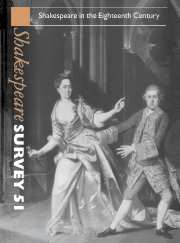Book contents
- Frontmatter
- Shakespeare and the Eighteenth Century: Criticism and Research
- Daddy’s Girls: Shakespearian Daughters and Eighteenth-Century Ideology
- Shakespeare and Clarissa: ‘General Nature’, Genre and Sexuality
- Early Georgian Politics and Shakespeare: The Black Act and Charles Johnson’s Love in a Forest (1723)
- Race Mattered: Othello in Late Eighteenth-Century England
- From Pericles to Marina: ‘While Women are to be had for Money, Love, or Importunity’
- ‘A Thousand Twangling Instruments’: Music and The Tempest on The Eighteenth-Centruy London Stage
- Double Falsehood and the Verbal Parallels with Shelton’s Don Quixote
- Eighteenth-Century Performances of Shakespeare Recorded in the Theatrical Portraits of the Garrick Club
- Eighteenth-Century Editing, ‘Appropriation’, and Interpretation
- Shakespeare Survey: Beginnings and Continuities
- Destined Livery? Character and Person in Shakespeare
- Prejudice and Law in The Merchant of Venice
- ‘Many A Civil Monster’: Shakespeare’s Idea of the Centaur
- Shakespeare’s International Currency
- Repeopling the Globe: The Opening Season at Shakespeare’s Globe, London 1997
- Shakespeare Performances in England, 1997
- Professional Shakespeare Productions in the British Isles, January–December 1996
- TheYear's Contributions to Shakespeare Studies: 1 Critical Studies
- 2 Shakespeare’s Life, Times, and Stage
- 3 Editions and Textual Studies
- Books Received
- Index to Volume 51
- General Index to Volumes 41–50
From Pericles to Marina: ‘While Women are to be had for Money, Love, or Importunity’
Published online by Cambridge University Press: 28 March 2007
- Frontmatter
- Shakespeare and the Eighteenth Century: Criticism and Research
- Daddy’s Girls: Shakespearian Daughters and Eighteenth-Century Ideology
- Shakespeare and Clarissa: ‘General Nature’, Genre and Sexuality
- Early Georgian Politics and Shakespeare: The Black Act and Charles Johnson’s Love in a Forest (1723)
- Race Mattered: Othello in Late Eighteenth-Century England
- From Pericles to Marina: ‘While Women are to be had for Money, Love, or Importunity’
- ‘A Thousand Twangling Instruments’: Music and The Tempest on The Eighteenth-Centruy London Stage
- Double Falsehood and the Verbal Parallels with Shelton’s Don Quixote
- Eighteenth-Century Performances of Shakespeare Recorded in the Theatrical Portraits of the Garrick Club
- Eighteenth-Century Editing, ‘Appropriation’, and Interpretation
- Shakespeare Survey: Beginnings and Continuities
- Destined Livery? Character and Person in Shakespeare
- Prejudice and Law in The Merchant of Venice
- ‘Many A Civil Monster’: Shakespeare’s Idea of the Centaur
- Shakespeare’s International Currency
- Repeopling the Globe: The Opening Season at Shakespeare’s Globe, London 1997
- Shakespeare Performances in England, 1997
- Professional Shakespeare Productions in the British Isles, January–December 1996
- TheYear's Contributions to Shakespeare Studies: 1 Critical Studies
- 2 Shakespeare’s Life, Times, and Stage
- 3 Editions and Textual Studies
- Books Received
- Index to Volume 51
- General Index to Volumes 41–50
Summary
George Lillo's Marina was first staged at the Theatre Royal in Covent Garden on 1 August 1738. After its lack-lustre premiere, Marina was only revived twice, although the Shakespearian original was restored to the stage as late as 1854. Despite the recently renewed interest in Shakespearian adaptations and the after-life of the Shakespearian text both on stage and on the page, Lillo's Marina remains one of the least-known early Augustan adaptations of Shakespeare.
There are several reasons for the limited critical attention devoted to Lillo's only attempt to 'improve' on Shakespeare: first, Lillo's reputation as a playwright rests exclusively on his best-known play, The London Merchant, Or the History of George Bamwell, an experimental domestic tragedy which secured him vast success and popularity during his life-time, and enduring credit among theatre scholars; secondly, the tendency to use Shakespeare as raw material for new plays had started to decline by the early 1730s; and, most importantly, Lillo's adaptation seems to have shared the critical and theatrical misfortunes of its Shakespearian original. Ever since Ben Jonson sarcastically described Pericles as a 'mouldy tale', where 'we see . . . many seas, countries, and kingdoms passed over with . . . admirable dexterity', critics have regarded this late romance as exceptionally unshakespearian, as a 'curiously amorphous anomaly'.
- Type
- Chapter
- Information
- Shakespeare Survey , pp. 67 - 78Publisher: Cambridge University PressPrint publication year: 1998

